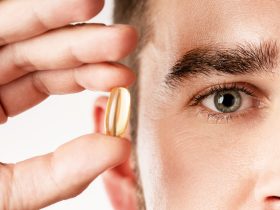Turmeric offers numerous benefits for men’s physical and sexual health. Learn about the various ways turmeric can enhance your well-being and how to incorporate it into your routine.
When considering the advantages of turmeric for men, you might be aware that it’s beneficial. Still, you may also be unsure about its specific effects and whether you should take a supplement or sprinkle turmeric on your meals to boost your health.
“Turmeric, a spice utilized in Middle Eastern and South Asian cuisines for almost 4,000 years, has gained popularity in Western culture in recent times,” explains Catherine Karnatz, MPH, a registered dietitian from Rhode Island. Karnatz highlights that turmeric’s vibrant yellow color contributes to the rich hue of curry. In addition to elevating the flavor of your dishes and smoothies, turmeric can be taken as a supplement in forms such as capsules, liquid extracts, and tinctures.
In the following sections, you’ll discover the benefits of turmeric, recommended dosages, and possible side effects. By the end of this article, you’ll clearly understand how turmeric can positively impact men’s health.
What Is Turmeric And Its Uses?
The bulbous, flowering plant with an orange interior has gained significant attention for its health benefits. It’s a staple on juice shop menus and is prominently displayed in health food stores through various turmeric supplements. Turmeric is a botanical relative of ginger root cultivated in Southeast Asia, explains Kim Yawitz, RD, the owner of Two Six Fitness in St. Louis, MO.
“While its underground stems are used to create cooking spices, it has also been a part of Eastern medicine for over 4,000 years,” she elaborates.
Derived from the Curcuma longa root, which belongs to the ginger family, turmeric resembles ginger root. The key distinction, however, lies in turmeric’s vibrant golden-yellow hue. This color comes from its active compound, curcumin, as highlighted by materials from Johns Hopkins University.
You might have encountered curcumin when researching turmeric’s benefits for men or examining supplement labels. Since most of turmeric’s positive effects are attributed to curcumin, the terms “turmeric” and “curcumin” are often used interchangeably in supplements and research, according to Karnatz.
Advantages of Turmeric for Men
Turmeric encompasses various plant-derived compounds that offer a range of potential health advantages. Within this group, curcuminoids stand out, delivering remarkable health-boosting effects. This includes the potent component we previously highlighted: curcumin.
Both men and women can reap the benefits of turmeric. Curcumin, the active element in turmeric, balances cholesterol levels, enhances immune function, prevents clotting, and safeguards the heart and liver. It’s an excellent choice to prioritize for heart health. Additionally, it alleviates chronic pain and supports the healthy blood supply to vital organs.
Reduces Inflammation
Curcumin is celebrated for its anti-inflammatory, anti-aging, and antioxidant attributes. It’s the most robust, naturally occurring anti-inflammatory substance available.
After a workout, your body’s inflammation rises as a part of the healing process. However, excessive inflammation can interfere with essential cellular functions such as metabolism and harm specific cellular structures like arteries.
Alleviates Disease Symptoms
Scientists propose that the anti-inflammatory impact of curcumin can significantly alleviate the symptoms associated with conditions like inflammatory bowel disease, arthritis, psoriasis, depression, and others, as stated in a 2021 study featured in Drug Design, Development, and Therapy. It’s anticipated to be a potential therapeutic option for managing these related health issues.
Apart from the antioxidant and anti-inflammatory properties of turmeric mentioned earlier and the benefits for men, the spice has exhibited potential in managing high cholesterol and anxiety—though usually when used alongside other treatments,” notes Yawitz. She cites a 2017 study published in Food.
Embrace turmeric as a spice and/or supplement while adhering to a sustainable lifelong healthy diet (such as the green Mediterranean diet). Also, discard unhealthy habits like smoking, a sedentary lifestyle, and consuming processed or saturated fat-rich foods to reduce inflammation.
Enhances Joint Well-being
A comprehensive examination of existing research was undertaken by scientists in 2016 to assess the impact of turmeric on symptoms of joint arthritis. This meta-analysis, featured in the Journal of Medicinal Food, unveiled that turmeric possesses both anti-inflammatory and antioxidant attributes, which could aid in alleviating pain and reducing swelling.
Delivers Pain Alleviation
Another thorough analysis, detailed in the BMJ Open Sport & Exercise Medicine journal in 2021, directly compared turmeric with ibuprofen and diclofenac as treatments for joint pain—specifically targeting knee osteoarthritis. The findings revealed that both sets of patients experienced substantial pain relief.
Much like the advantages ashwagandha offers for men, turmeric has an extensive history of use in Eastern Asian and Ayurvedic medicine. It combats inflammation by restraining the body’s production of inflammation-triggering chemicals. A review from 2020, featured in Frontiers in Pharmacology, outlines this mechanism—quite akin to how over-the-counter pain medications function.
Assists in Post-Workout Healing
Evidence suggests its potential to alleviate muscle soreness following a workout, according to her insights. Further research is required to solidify the credibility of these potential benefits linked to turmeric.
Frequently Asked Question
How Does Turmeric Affect Male Hormones?
Yawitz states, “Turmeric and turmeric powder are unlikely to influence male hormones mainly because curcumin is highly unstable.”
As the dietitian highlights, certain studies have examined specialized water-soluble curcumin capsules, which theoretically could increase curcumin levels in the bloodstream. Yawitz explains, “In a 2022 study in Scientific Reports, mice and rats that received a water-soluble curcumin supplement exhibited higher testosterone production. However, standard curcumin supplements didn’t yield any significant effects.” Nonetheless, other animal studies, like a 2018 research article published in Cancer Science, have indicated the potential of curcumin to reduce the production of male sex hormones.
Karnatz emphasizes that there have been limited human studies investigating the potential influence of turmeric on male hormone function. A 2015 Toxicology Reports study noted that administering curcumin to hypertensive male rats might elevate testosterone levels. However, due to the scarcity of research, it remains challenging to determine whether curcumin supplementation yields a comparable impact on testosterone in male humans, Karnatz concludes.
As Yawitz clarifies, “There hasn’t been a sufficient number of human studies to recommend turmeric (or curcumin) as a natural testosterone booster.”
Can Turmeric Boost Sperm Count?
Research into the impact of turmeric on sperm quality and even fertility outcomes primarily involves animal studies, with relatively limited exploration in human research.
According to Karnaitz, a 2022 study featured in the International Journal of Molecular Sciences focused on male rats revealed that supplementing with turmeric could potentially enhance sperm quality and contribute to improved fertility outcomes. She underscores the lack of substantial human research to confirm whether turmeric would yield a comparable effect in humans.
Regarding sperm protection, antioxidants are believed to play a role in safeguarding sperm cells from harm. However, despite possessing antioxidant properties, it’s not definitively established whether curcumin can enhance sperm count,” says Yawitz. She references a 2021 animal study featured in Molecules, which indicates that curcumin might positively impact sperm production, quality, and motility. Nonetheless, Yawitz mentions that other studies raise caution, such as a 2012 study on mice, suggesting curcumin could reduce sperm count.
Is Turmeric Beneficial for Libido?
“Numerous websites—often those selling supplements—have promoted turmeric as a natural libido enhancer,” notes Yawitz. This enthusiasm primarily stems from animal studies, including the research in Toxicology Reports, which proposes that turmeric could elevate testosterone production. Yawitz further points out that turmeric was historically utilized as an aphrodisiac in ancient India.
Fortunately, there exist numerous approaches to enhance absorption. Among the most prevalent methods are combining turmeric with piperine (or black pepper extract) or incorporating it alongside dietary fats.
“Integrating foods containing healthy fats can enhance its absorption, and adding a pinch of black pepper can have the same effect.” According to a 1998 study published in Planta Medica, this common kitchen seasoning heightens the absorption of curcumin.
Another option is to blend turmeric with companions like avocado and coconut oil or incorporate it into dishes like chicken, tofu, and other nutritious choices. Additionally, you can opt for beverages infused with turmeric.
Incorporating Turmeric into Your Diet
A drawback of curcumin is its limited absorption in the digestive tract upon consumption (denoting low bioavailability).
“Most curcumin gets metabolized and expelled by the body before it can unleash its benefits,” highlights Yawitz.
Best 3 Turmeric Supplements
These top-rated supplements come with the endorsement of Jordan Mazur, who co-authored this article and was the Director of Performance Nutrition and Sports Dietitian for the San Francisco 49ers.
Solti Turmeric SuperShot: Integrate one shot into your daily routine on an empty stomach or with food. This provides 17 grams of turmeric, fortified with black pepper extract, for enhanced absorption.
Thorne Meriva-SF (Sustained Release): Take 2 capsules once or twice daily (500 mg each) to benefit from a gradual curcumin release easily absorbed by the body.
Life Extension Super Bio-Curcumin BCM-95: Consume 1 capsule per day (400 mg) with your meals. This capsule contains a patented blend of curcumin combined with essential oils.
Potential Turmeric Side Effects
As with any dietary supplement, turmeric supplements may come with side effects. The positive aspect is that these effects—such as nausea and diarrhea—are typically mild, especially when consumed in moderation. Yawitz emphasizes that turmeric is generally well-tolerated in doses up to 12,000 mg.
Individuals who haven’t previously included turmeric in their diet might have a higher likelihood of encountering minor digestive discomfort, such as a stomach ache. Opting for supplements free from artificial or synthetic additives can minimize these side effects.















Find Us on Socials